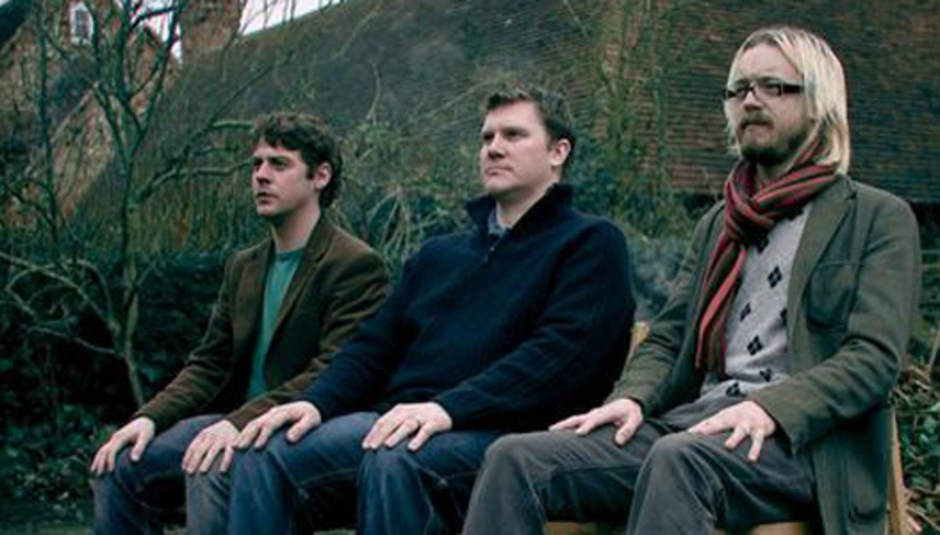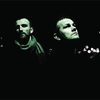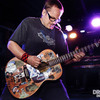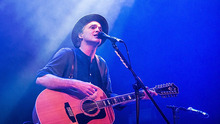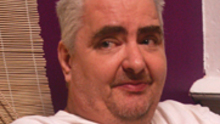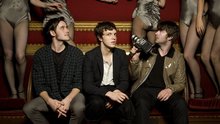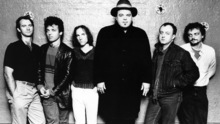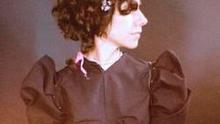It's not an exaggeration to say that just a mere handful of people had heard of, let alone heard Sweet Billy Pilgrim's music before their nomination for last year's Mercury Prize. Their somewhat surprise nomination was for their beautiful second record Twice Born Men, an album which was also released on David Sylvian's Samadhi Sound label.
Ahead of their apperance at Hop Farm Festival, we caught up with the trio's main man Tim Elsenburg over a very dodgy phone indeed to talk about new material, the Mercury nomination, what he's listening to at the moment and, of course, festivals, festivals, festivals Here's what he had to say for himself...
DiS: Hey Tim, how's it going? What have you been up to of late?
Tim Elsenburg: Yeah, always well. We just got back off tour last week so I've been recovering from that because it was a bit exceptional in terms of the driving...
DiS: Oh right?
TE: We were on tour with Jamie Cullum on the European leg and the only way we could do it and afford to do it was if we drove, so we were doing between eight and ten hours a day in a Ford Mondeo. So yeah, it was great. We got to play some amazing places and to the most people we've ever played to - it was just incredible really, and went on and on. I find it hard to believe that the roads were so straight and went on for so long!
DiS: Must've been a struggle to stay awake...
TE: I don't know quite how we did it but we did – it's taken us a good week to recover from it all.
DiS: What else have you been up to since the release of Twice Born Men last year?
TE: A bit of remix work, I did one for Bat For Lashes. We've basically started writing the new album as well, with which I wanted to do something slightly different - to make it more like blokes in a room playing, as opposed to the massive amount of layering that was on the last record.
DiS: How much have you written of it?
TE: It's all in process because the last record I had one idea and then started recording the songs which were all put together in the studio. With this one, because we've been busier and haven't had the opportunity to be in a studio as much, I've been writing more of it up front with a guitar and a piano. I'd say we're probably 75% of the way there...we've still got to write lyrics and a few other things. I kind of want to make it a grand pop record because I've been listening to a lot of pop music recently. When I say “pop music” I mean Field Music and that sort of thing.
DiS: Do you think it's been much of a challenge to change your approach?
TE: Yeah, I guess the problem is...I say all these things and have all these grand plans and designs but whatever comes out in the end is what happens...
DiS: I was just reading about your shed-cum-recording studio...it sounds pretty neat. Tell us a bit more about it...
TE: It was just a necessity really - my father was a joiner by trade and there's a shed at the bottom of the garden which was for lawnmowers and what not but I stripped it out and put all of my musical junk, of which there is much, down there and carpeted the floors and ceilings. But it's just a shed, slightly larger than your normal garden shed. We had to work with the door open in the Summer and Winter so there was enough oxygen. A lot of the time in the Winter I'd be sitting there with fur-lined wellies on and a big coat. The problem is when you wear a parka the nylon is very swishy so the microphone picks it all up...
DiS: And it's not really practical to wear woollen gloves when you're playing guitar either...
TE: No, generally not! We had to do the whole album piecemeal – when the kids were asleep, when I got back from work early...bits and pieces. I guess I have the tendency to work at stuff and work at stuff until it's done, which doesn't give you the benefit of reflection and looking at what you've done and doing it this way you have to – if you've got three hours and you might not have another three hours for a week so you have to have those gaps and look at what you've done. It's quite a good way of working but at the same time is extremely long-winded and frustrating. Obviously I didn't want to do a day job but, y'know...
DiS: Going back to last year now, how much of a surprise was the Mercury nomination? Did you get told much in advance?
TE: Yeah, kind of. You do get a couple of weeks up front where you're sworn to secrecy to make sure you're prepared with enough stock in shops and things. I just didn't believe it. I thought it was a very cruel joke and there was a lot of bad language on the phone. I had to be phoned back, I was at work and was at a pretty low ebb in terms of what I was doing at work and it was also a pretty grim day. It was just one of those fairy tale moments and I think most of us are suspicious of things like that...I just didn't believe it but then they phoned me back and explained. I still can't believe it. And that particular award as well – it's away from the politics cynicism and it just meant so much, it really did.
DiS: I guess it's nice to get something like that, even though you know you've made a good record, it's nice to feel that other people understand what you're doing and moreover appreciate it. It's a big stamp of approval really...
TE: Yeah, it is and it does mean that little bit more. You know when you hear a really great record and you want people to know, like before you go down the pub and you say “c'mon, you've got to listen to this!” it's kind of like that but on a massive scale. The problem I had was that when we were there on the day thinking “what are we doing here?!”. We had to carry our own gear in, we had to set up our own stage. When we first got there the crew thought we were the roadies, which we were in a way. There were moments of feeling little and amateurish and just a bit rubbish, when you see Kasabian in the other corner of the room with ten blokes setting all their stuff up. I had to keep saying to myself that we deserved it, we worked so hard for it - we had the additional aspect of finishing work at 6 o'clock and going to rehearsal, coming out of rehearsal and 1.30AM, getting up at 5.30 to go to my day job. We didn't get to 28 and think “you know what? Fuck this, I'm just going to get a day job”. It didn't occur to us, it's was just what we do. We have day jobs which is a bit of an inconvenience, but that's just the way it is. But on the day I was literally saying to myself “this is right, you do deserve this, it's fine to be here and you shouldn't feel awkward” but it was completely surreal...
DiS: Has it changed you much in your approach? In your philosophy or ethos?
TE: No. I've tried very hard for it not to, I guess. I don't want any of the stuff that people like about us to change, for that reason. It's weird. I do feel for the first time a little bit of expectation. I don't want to make it sound grand because I know it's not that many people, but I'm aware of the fact that there are people paying attention, whereas with the previous two records that's not something I had to think about at all, it was just the case of making a record because I had the songs in my head and the ideas and there wasn't any consideration that at the end of it there might be some people who want to listen to it. But now I'm in the weird position of – well, not weird really but as a musician that's always what you hope for – but we kind of hope there are people waiting to see what happens...
DiS: The Sweet Billy Pilgrim name is out there now...
TE: I'm sure they're not wasting too much time worrying about it, but it does feel strange more than anything else, to actually write and record with that in mind for the first time. I don't want to take it for granted and every time someone writes to us or comes up to us after a show it's just the most lovely thing in the world that someone has had an emotional reaction to something you've done. I would never take that for granted but it's strange to bear in mind when you're actually making a record...
DiS: Do you still tour with other bands? As in playing for them...
TE: We haven't done so for a while but that's not to say that we wouldn't. To be honest I'm the only one who has managed to give up the day job through a combination of publishing and what not so I guess if one of the other two, or even me depending on the situation, if we didn't have to do a day job for 6 months or however long we'd have to think about it. It's not out of the question...
DiS: How did you come about working with David Sylvian? Obviously your record's out on his label...
TE: Well, it was a remix that I did for him. Originally I knew people who knew people. I did the remix and just kept in touch with him, because I think the remix ended up on a remix album of Blemish and every song on Blemish was reworked. He liked it and I enjoyed doing it. As you can probably imagine listening to what I do, I've been a fan of his since...forever. So I kept in touch by e-mail and on the new record I was sending him things for advice and suggestions. Then a point came when I'd sent him everything that could make an album and he said “why don't you put it out on my label”. I probably thought about it for a two seconds and said "yeah, that'd be amazing!". It's great because I could ask him questions about the records I grew up with and his working methods and to be able to do that without embarrassment to one of your heroes is great...and then to be asked to put out a record on his label. We're the pop act on the label, the Take That of Samadhi Sound! Plenty of esoteric stuff. Yeah, he came up with the artwork and that picture for the record...
DiS: Good artwork that it is...
TE: Yeah, it's really good and ideal. I had something else in mind that was rubbish so he saved us from that! It just perfectly fits the mood of the record and captures everything, so he's been great and really supportive.
DiS: How are the festivals going, you played many yet?
Yeah, we've got The Hop Farm festival with Van Morrison headlining. We're doing Latitude. Still not sure on a couple of them but we're doing quite a few foreign ones. One in Portugal, Poland – I can't remember the names any of them! We did one in Norway called Punkt, which is a kind of left field Scandinavian jazzers and electronic experimental music. It'd weird how we seem to fit into all sort of different things. We're one of the few bands who I can't think are pigeonholed in any way, though we got the folktronica tag fairly early on but we've toured now with world music artists, Jamie Cullum, we played the Bergen Jazz Festival...and it's just odd. We also supported The Who at the Royal Albert Hall, you wouldn't guess where we'd turn up next and it's really nice for us. It's also lovely to see the faces of the audience when one of the guys in the band steps out with a banjo, especially supporting The Who.
DiS: I think there's enough underlying quality to transcend any genre, like all good music does...but it must be nice to have a diversity of where you play and who you play with...
TE: Yeah, definitely. I wasn't knocking it and all the people we've played with and all the festivals we've played at all seem to be about the music. People going out and wanting to find new and exciting things and just being open to it. We played with Rokia Traore and the music couldn't be more different, but the people who went to see her were just excited about music so they enjoyed what we did and gave us a chance which meant we could play some decent-sized venues with good sound systems. It's very heartening. It seems that the longer people spend in “the business” the more cynical they get but I'm finding the opposite. Even business-wise the people I've had dealings have always been about loving music. Fundamentally it's great if we can make some money and I'm not offended if people think they can make money out of what we do but they still buy loads of records...even the guys we deal with at EMI are amazing. The guy who does our distribution regularly e-mails us with stuff we should be listening to, it's brilliant.
DiS: If you could pick a festival bill, who would be the top 3 or 4 current acts to play?
TE: At the moment I really love the new Field Music record, that's amazing. The These New Puritans one is just like nothing else I've ever heard on Earth. You know when you listen to a record and you just can't imagine the process that went into writing it? It's just incredible. The Peter Gabriel covers record was also amazing, his version of 'Heroes' was the first time I've actually listened to the lyrics. Sam Amidon...I sort of know Beth Orton via the workshops I did and she's on the new record and her voice just fits perfectly with what he does. Rolo Tomassi, I think they're awesome, I find it very hard to believe that people can play that tightly...
DiS: The musical definition of organised chaos...
TE: Yeah, totally. It's like a flock of birds that all turn at the same time but you're not quite sure how they did it. It's kind of got that math-rock and Captain Beefheart thing and her voice – how on earth does she do that? How does she switch? And how do you do a tour and still have vocal chords at the end of it, it's crazy...and Joanna Newsom...but basically the rest of it is metal! The new Deftones record I'm pretty mad about...and the Sunn O))) record from 2009. That's certainly my favourite record last year – the sound of the tectonic plates of the earth moving. It's just beautiful...
DiS: Is it nice to play at a festival without any branding? It must make a change...
TE: Yeah, I mean for that reason for many years I've not been a great festival goer for just that feeling of being herded a little bit. We did The Big Chill last year and I'm sure it's very corporate but it was an example to me that that's how it could be – that there was space to move and that there was attention paid to people's needs. That opened my eyes a little bit and the line up was good as well. And the way it was done, there wasn't the horrible feeling of being rushed around thinking “if I go and see that I'm going to miss that” and it was much more relaxed atmosphere. I've been told good things about Latitude, too. For me it seems inevitable that it's going to be corporate but it's whether or not you can make this a pleasant experience for people and a chance for new bands to play as well. It's an ideal place for new bands to play because people are in a good mood and are open to stuff.
DiS: It's different to the usual gig bill for a supporting artist...
TE: Then there's that thing of people just wandering about and hearing a noise form a corner of a field and just going to have a look, wandering past and just investigating it. You meet people and they talk about music to you. It's a whole community thing and it's great to be around.
DiS: How do you find converting your sound from the record to the live arena, more so at festivals – the intricacies of it must be hard to convey on a vast scale and I'm guessing the sound quality varies at each festival...
TE: It was very hard – that's probably been the hardest thing of all. Because everything was written on a specific instrument I had to go back and learn the songs from scratch on guitar and piano. Almost like doing a cover version of my own song, just bizarre. One of the songs on the first record, for example, was written on this little plastic guitar that my little boy had in a tuning that I had no idea of, it only stayed in tune for 30 seconds at a time. And then I had to work out what the hell I played...it just took forever. We just tried to make things a bit more dynamic and a bit more direct, as well as a bit more guitar-based.
DiS: Obviously your music, as well with most people's, is inspired by various things, notably the last album name and the band name. What non-musical things have been inspiring you lately?
TE: Yeah, erm...Terrence Malick if I could name one person from another sphere of things. He's got that sense of stillness in films with The Thin Red Line and Badlands; The New World especially, with Colin Farrell. I'm not very good at stillness personally – I have to go out and wander about but his films are in no rush or hurry. Also as inspiration just generally beautiful things that remind you you're alive – y'know the kind of emotions in a human beings without the hustle and bustle. When something beautiful stops you in your tracks, it's a reminder of what it is to be human. Just little things like that when you're driving listening to music at the same time as going over the crest of a hill and you see something beautiful and it just comes together. I just try to do the same, to try and do something beautiful. It's what keeps me looking for new records and books because I want that, I want that feeling. It's really fundamental to what makes me feel like a human being. And it gives me hope as well. Makes me feel that people are still making, doing and singing beautiful things and while that goes on there's hope for our species really. It's heartening...
Sweet Billy Pilgrim will be playing Hop Farm Festival on Friday 2 July. More information on that here.

